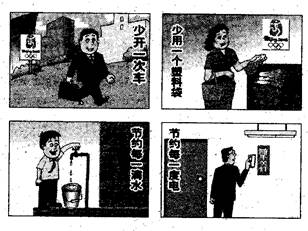题目内容
第Ⅱ卷非选择题部分
第三部分:写作(共三节,满分30分)
第一节:单词拼写( 共10小题;每小题0.5分,满分5分)
66. He a__________ to Mary for being late; however, her anger didn’t melt.
67. The colleges and universities were only for men then, and women were not
p _______to attend .
68. They're busy_________(准备)to go on holiday.
69. His _______ (面部的)expression suggested that he was very content
70 .G__________ speaking , parents care more about their children's health than about their own.
71. I don't know where the e _______ to the cinema is.?
72. Two hundred s___ bicycles were returned to their owners last month with the help of the police.
73.Several new railways are under c_________ in China.
74. She looks f__________ to me, but I can’t remember her name.
75. I changed into my sports shoes so that I could walk more c________.
66.apologized 67.permitted 68.preparing 69.facial 70.generally 71.entrance 72.stolen 73.construction 74.familiar 75.comfortably

第II卷 非选择题 (两部分,共35分)
第四部分 任务型阅读 (共10小题,每小题1分,满分10分)
请认真阅读下列短文,并根据所读内容在文后表格中的空格里填入一个最恰当的词。
注意:每空只填1个单词。请将答案写在答题卡上相应题号的横线上。
Do we need an “Ivy League”?
China may soon have its own “Ivy League”, with a union of top universities.
The term originally referred to an athletic conference of eight top universities in the northeastern US. The Chinese version, which was officially started in mid-October, consists of nine famous universities, including Peking, Tsinghua, Zhejiang and Fudan. The union is supposed to result in student exchange programs, recognition of academic achievements, and other joint programs.
The news of this Chinese “Ivy League” has received mixed responses from the public and press. Some negative critics have dismissed it as yet another example of the wishful copying of international practices without fully understanding them. Others say that the “Ivy League” is not necessary but that the union is a good idea, one that could promote academic development.
So what’s your opinion on a Chinese “Ivy League”? Do we need one?
Yes. Ivy League or not, nine of China’s best universities cooperating is a good thing.
These universities combining resources could create a better environment for students and for research. It could also save a lot of time and resources because it would mean fewer unnecessary investments for some of the universities.
Allowing students to move to or have exchanges with other universities could broaden their horizons, improve their social skills and create more employment opportunities. The results could be more important than lessons and achievements.
The term “Ivy League” carries a sense of academic excellence, tradition and reputation. If borrowing such a term could encourage students’ and professors’ mental state and improve Chinese higher education, then there’s no reason not to do it.
No. Universities should do some work on increasing cooperation instead of copying an “Ivy League” model.
Many Chinese universities already have such cooperation with each other. If this cooperation were associated with the “Ivy League”, it would just distract (分散) attention and resources and have a negative effect.
These Chinese universities are all state-run and most get their funding from the government. They’re quite similar to each other in many ways and more cooperation wouldn’t bring about as much potential ability as between , say, public and private, or Chinese and foreign universities.
China should find its own way to develop world-class universities instead of by copying some foreign practices. We have our own unique conditions and foreign lessons often don’t apply well here.
|
Ivy in America |
Originally referred to an athletic conference of eight famous universities in the 71 of America |
|
|
Ivy in China |
Member universities |
Nine famous universities |
|
Purposes of the union |
* To exchange students |
|
|
* To 72 the academic achievements |
||
|
* To work on joint programs |
||
|
73 from the public |
Positive side |
1. The cooperation is good for the 75 of resources and creation of a better environment. |
|
2. Students will have 76 difficulty finding jobs through the student-exchange program. |
||
|
3. The cooperation will encourage students and professors 77 . |
||
|
74 side |
1. Attention will be drawn away and 78 will be divided. |
|
|
2. The cooperation won’t have great effect because of their 79 in running universities. |
||
|
3. China should develop world-class universities in its unique way without 80 foreign practices blindly. |
 My parents and I went to the park last Sunday. There were lots of visitors stand in front of the ticket window. We waited a long time and buy three tickets. In the Tiger Mountain of the park, I was too eager to see the fierce frightened animals that I quickened my steps through the crowd. Unfortunate,I got separated from my parents. I had hard time looking for them, and I had no luck. Wandering in the park,I felt alone without any companions. Worse still,I had no money, so I had to walk to home, covering as much as 5 kilometer.
My parents and I went to the park last Sunday. There were lots of visitors stand in front of the ticket window. We waited a long time and buy three tickets. In the Tiger Mountain of the park, I was too eager to see the fierce frightened animals that I quickened my steps through the crowd. Unfortunate,I got separated from my parents. I had hard time looking for them, and I had no luck. Wandering in the park,I felt alone without any companions. Worse still,I had no money, so I had to walk to home, covering as much as 5 kilometer.